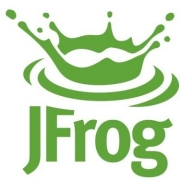

GitLab and JFrog DevOps Cloud Platform are competitors in the DevOps landscape. GitLab often has the upper hand due to its comprehensive CI/CD and cost-effectiveness, while JFrog attracts attention for its superior artifact management.
Features: GitLab is recognized for its built-in CI/CD pipeline, project management tools, and collaboration features that enhance the efficiency of DevOps processes. JFrog DevOps Cloud Platform is notable for its artifact management capabilities, binary lifecycle management, and robust integration with multiple development tools. The distinction lies in GitLab's broader functionality compared to JFrog's specialized approach in managing artifacts and binaries.
Ease of Deployment and Customer Service: GitLab stands out with its user-friendly deployment, offering clear documentation and effective support that smoothens the deployment process. JFrog DevOps Cloud Platform, on the other hand, requires more technical expertise for full integration, making its deployment potentially more challenging. Nevertheless, it is supported by detailed and complex documentation.
Pricing and ROI: GitLab is considered more affordable with attractive ROI through its integrated DevOps tools which are generally economical. JFrog DevOps Cloud Platform, while having higher initial costs, brings significant value with its advanced artifact management, which can be advantageous for large environments that benefit from its extensive capabilities.
| Product | Market Share (%) |
|---|---|
| GitLab | 9.7% |
| JFrog DevOps Cloud Platform | 2.5% |
| Other | 87.8% |


| Company Size | Count |
|---|---|
| Small Business | 36 |
| Midsize Enterprise | 10 |
| Large Enterprise | 46 |
GitLab offers a secure and user-friendly platform for CI/CD pipeline management, code repository control, and collaboration, enhancing development speed and efficiency. It facilitates automation with extensive customization and tool integration, ideal for DevOps processes.
GitLab supports source code management, version control, and collaborative development. It's frequently used in CI/CD processes to automate builds and deployments while integrating DevOps practices. GitLab allows companies to manage repositories, automate pipelines, conduct code reviews, and maintain development lifecycles. The platform supports infrastructure and configuration management, enabling efficient code collaboration, deployment automation, and comprehensive repository handling. Many organizations commit and deploy developed code using GitLab's capabilities.
What are GitLab's most valuable features?In specific industries, GitLab serves as a backbone for source code management and CI/CD implementation. Companies leverage its capabilities for infrastructure management and deployment automation, thus streamlining project delivery timelines. Its ability to handle configuration management and code repositories effectively aids in maintaining development lifecycles, making it a preferred choice for organizations committed to enhancing their DevOps practices.
The JFrog DevOps Cloud Platform optimizes software development life cycles through robust artifact management, CI/CD automation, and strong version control. Notable for its security features, it supports seamless software version maintenance and vulnerability scanning. Praised for enhancing organizational efficiency, it ensures faster, secure deliveries, improving collaboration within teams.
We monitor all DevSecOps reviews to prevent fraudulent reviews and keep review quality high. We do not post reviews by company employees or direct competitors. We validate each review for authenticity via cross-reference with LinkedIn, and personal follow-up with the reviewer when necessary.